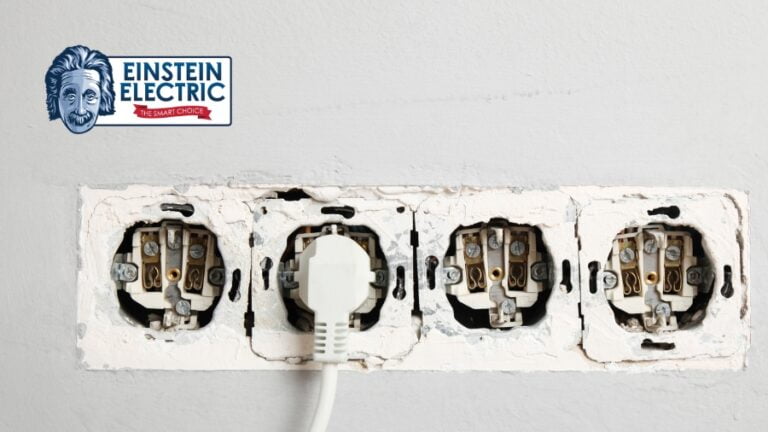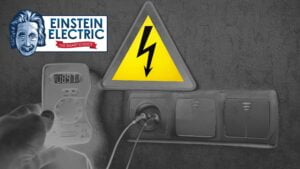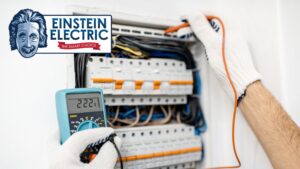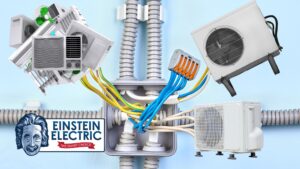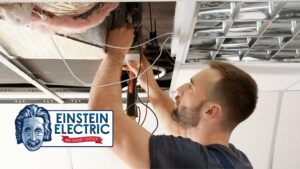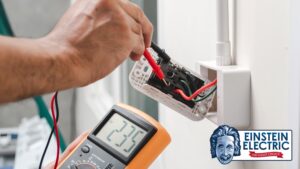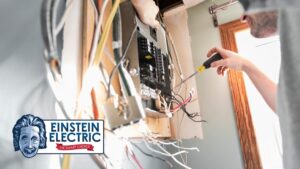Introduction:
Electricity is an integral part of our lives, powering our homes, workplaces, and various devices. While it brings convenience and comfort, it is essential to remember that electricity can be hazardous if not handled properly. To ensure your safety and that of those around you, it is crucial to be aware of certain precautions and follow essential guidelines. In this blog post, we will discuss ten essential tips for staying safe around electricity.
- Understand Basic Electrical Knowledge:
Start by familiarizing yourself with basic electrical knowledge. Learn about electrical circuits, wires, and components. Understand the difference between voltage, current, and power. Knowing these fundamentals will help you better understand the potential risks associated with electricity.
To ensure your safety around electricity, it is crucial to start by familiarizing yourself with basic electrical knowledge. Understanding electrical circuits, wires, and components will provide you with a solid foundation. You should be able to differentiate between voltage, current, and power.
Voltage refers to the electrical force that pushes the current through a circuit. It is measured in volts (V) and determines the intensity of the electrical flow. Current, measured in amperes (A), represents the rate at which the electricity flows through a conductor. Power, measured in watts (W), indicates the amount of electrical energy consumed or produced.
Knowing these fundamentals will help you comprehend the potential risks associated with electricity. For instance, understanding the relationship between voltage and current can help you recognize the potential for electric shock and the severity of its effects. Recognizing the power requirements of different appliances can assist in preventing overloading and electrical fires.
By having a basic understanding of electrical concepts, you can make informed decisions when dealing with electrical systems. It enables you to identify potential hazards, take appropriate precautions, and communicate effectively with professionals, such as electricians, when seeking assistance.
Remember, electrical safety starts with knowledge, so invest some time in learning the basics to ensure your well-being and the safety of those around you.
- Hire a Licensed Electrician:
When it comes to electrical installations or repairs, always hire a licensed electrician. They possess the necessary expertise and knowledge to handle electrical systems safely. Attempting electrical work without proper training can lead to serious accidents, fires, or even electrocution.
Licensed electricians undergo rigorous training and education to understand the intricacies of electrical systems. They are well-versed in local building codes, safety regulations, and industry standards. Their expertise enables them to identify potential hazards, design appropriate electrical layouts, and troubleshoot complex issues.
By hiring a licensed electrician, you ensure that the electrical work is performed correctly and up to code. They have a deep understanding of electrical circuits, wiring techniques, and safety protocols. They can assess the electrical load, determine the appropriate wire size, and ensure proper grounding and insulation.
Attempting electrical work without the necessary knowledge and experience can lead to disastrous outcomes. Incorrectly installed wiring or faulty connections can result in electrical fires, damaging your property and endangering lives. Improper handling of live wires can lead to electrocution, causing severe injury or even death.
Moreover, hiring a licensed electrician provides you with peace of mind. They carry liability insurance, which protects you in case of any unforeseen accidents or damages during the project. Additionally, their work is subject to inspection and meets the required safety standards, reducing the risk of future electrical issues.
When it comes to electrical installations or repairs, never compromise on safety. Always hire a licensed electrician to handle the job. Their expertise, training, and adherence to safety regulations ensure that the work is done correctly, minimizing the risk of accidents, fires, or electrocution. Remember, your safety and the safety of your loved ones should always be the top priority when dealing with electricity.
- Avoid Overloading Outlets and Circuits:
Overloading electrical outlets or circuits can cause overheating and increase the risk of electrical fires. Be mindful of the number of devices you plug into an outlet. Use power strips or surge protectors for additional outlets, but make sure they are not overloaded either.
Electrical outlets are designed to handle a specific amount of electrical current. When you exceed the capacity of an outlet by plugging in too many devices, it can cause the wiring to overheat. This overheating can lead to melted insulation, sparks, and potentially ignite a fire.
To avoid overloading outlets, distribute your electrical devices across multiple outlets whenever possible. Consider the power requirements of each device and balance the load accordingly. If you find yourself constantly relying on a single outlet, it may be an indication that you need additional outlets installed by a licensed electrician.
Power strips and surge protectors are useful tools for providing additional outlets, but it’s crucial to use them responsibly. Avoid plugging high-powered appliances, such as refrigerators or air conditioners, into power strips, as they can consume a significant amount of electricity and overload the strip. Additionally, check the manufacturer’s guidelines to determine the maximum load capacity of the power strip or surge protector, and ensure that it is not exceeded.
Regularly inspect power strips and surge protectors for any signs of wear or damage. If you notice frayed wires, loose connections, or scorch marks, immediately replace them to maintain electrical safety.
In conclusion, overloading electrical outlets or circuits is a serious safety hazard that can lead to overheating and electrical fires. Practice responsible use of outlets, distribute the load appropriately, and use power strips or surge protectors wisely. By taking these precautions, you can significantly reduce the risk of electrical accidents and ensure a safer environment for yourself and others.
- Regularly Inspect Cords and Wires:
Damaged or frayed electrical cords and wires can be extremely dangerous. Regularly inspect all cords for signs of wear and tear. If you notice any exposed wires or damaged insulation, replace them immediately. Avoid using extension cords as a permanent solution and ensure they are in good condition.
Examine cords for any visible damage, such as cuts, fraying, or cracks in the insulation. If you come across exposed wires, this is a clear indication of a hazardous condition. Exposed wires increase the likelihood of electrical shocks and can potentially cause fires. If you notice any of these issues, it is imperative to replace the damaged cord immediately.
Avoid using extension cords as a permanent solution for powering devices. Extension cords are designed for temporary use and should not be relied upon for long-term electrical connections. If you find yourself frequently relying on extension cords, consider hiring a licensed electrician to install additional outlets in convenient locations.
When using extension cords, ensure that they are in good condition and rated for the intended purpose. Check for any frayed or damaged areas along the length of the cord. Make sure the cord is not pinched or twisted, as this can cause internal damage over time. Additionally, avoid running extension cords under carpets or rugs, as this can cause overheating and potential fire hazards.
It is important to note that extension cords should not be daisy-chained or plugged into one another. This practice increases the risk of overloading the circuit and can lead to overheating, electrical fires, or damage to your electrical devices.
By regularly inspecting cords, promptly replacing damaged ones, and using extension cords responsibly, you can significantly reduce the risk of electrical accidents. Prioritizing the maintenance and proper use of cords and wires helps ensure a safe electrical environment for you and those around you.
- Keep Water Away from Electricity:
Water and electricity are a deadly combination. Never touch electrical switches, appliances, or outlets with wet hands, and keep electrical devices away from water sources such as sinks, bathtubs, and swimming pools. Install Ground Fault Circuit Interrupters (GFCIs) in areas prone to moisture, such as bathrooms and kitchens.By adhering to these guidelines, you can significantly reduce the risk of electric shock and potential harm.
Never touch electrical switches, appliances, or outlets with wet hands or while standing on wet surfaces. Moisture increases conductivity, making it easier for electric current to pass through your body, leading to electric shock. Always ensure your hands are completely dry before handling any electrical device or switch.
Keep electrical devices and cords away from water sources such as sinks, bathtubs, and swimming pools. Accidental splashes or contact with water can cause short circuits, electrical malfunctions, and even fires. Be particularly cautious when using electrical appliances near water, such as hairdryers, electric razors, or radios. Store these devices away from wet areas and unplug them when not in use.
To enhance safety in areas prone to moisture, such as bathrooms and kitchens, consider installing Ground Fault Circuit Interrupters (GFCIs). GFCIs are designed to quickly detect electrical faults and automatically shut off the power to prevent electric shock. These devices are highly effective in minimizing the risk of electrical accidents in wet environments.
Regularly check GFCIs to ensure they are functioning correctly. Test the device using the built-in test button to verify its proper operation. If a GFCI is not working or needs replacement, contact a qualified electrician to resolve the issue promptly.
Remember, water and electricity should always be kept separate. By avoiding contact between electrical devices and water, as well as installing GFCIs in moisture-prone areas, you can create a safer environment and minimize the risk of electrical accidents and potential harm.
- Be Cautious with Electrical Appliances:
Always exercise caution when using electrical appliances. Unplug appliances when not in use, and never yank the cord out of the outlet. Pull it out by gripping the plug firmly. Do not operate appliances with damaged cords or exposed wires, as they can pose a significant risk of electric shock.
By following a few simple guidelines, you can minimize the risk of accidents and ensure a safer environment for yourself and others.
Always unplug appliances when they are not in use. Leaving them plugged in unnecessarily not only consumes energy but also increases the risk of electrical hazards, such as short circuits or accidental activation. Make it a habit to disconnect appliances from the power source when you are finished using them.
When unplugging an appliance, avoid yanking the cord out of the outlet. This can damage the cord or the outlet itself, potentially causing electrical hazards or creating fire risks. Instead, grip the plug firmly and gently pull it out to disconnect the appliance from the power supply.
Inspect the cords of your appliances regularly. If you notice any frayed wires, exposed conductors, or damaged insulation, do not use the appliance until the cord has been repaired or replaced. Operating appliances with damaged cords can pose a significant risk of electric shock or even start a fire. Contact a qualified professional or the manufacturer for assistance in repairing or replacing the cord.
Additionally, be cautious with appliances that generate heat, such as irons, hairdryers, or space heaters. Keep them away from flammable materials and ensure they have sufficient ventilation. Never leave these appliances unattended while in use, and always turn them off and unplug them when you are finished.
By exercising caution when using electrical appliances, unplugging them when not in use, and avoiding the use of damaged cords, you can significantly reduce the risk of electrical accidents and promote a safer living or working environment. Remember, electrical safety is everyone’s responsibility.
- Use Grounded Outlets:
Ensure that all your electrical devices and appliances are plugged into properly grounded outlets. Grounding helps prevent electrical shocks and reduces the risk of electrical fires. If you live in an older home without grounded outlets, consider hiring an electrician to upgrade them.
Grounding is achieved through the installation of grounded outlets, also known as three-prong outlets. These outlets have a third prong, known as the grounding prong, which connects to a grounding wire. In the event of a fault or surge, excess electrical current is redirected through the grounding wire and safely dissipated into the ground.
If you live in an older home without grounded outlets, it is highly recommended to consider hiring a licensed electrician to upgrade them. Older homes often have outdated two-prong outlets, which lack the grounding feature and provide less protection against electrical hazards.
Upgrading to grounded outlets provides several benefits. It significantly reduces the risk of electrical shocks, especially in the case of faulty or malfunctioning appliances. Grounding helps ensure that any excess electrical current is safely discharged, preventing it from flowing through a person and causing harm.
Furthermore, grounding minimizes the risk of electrical fires. By providing a path for electrical faults to safely dissipate, the likelihood of electrical arcs or sparks igniting flammable materials is greatly reduced. This can be particularly crucial in areas where appliances or electrical equipment are used near combustible materials.
Hiring a professional electrician is essential to ensure the proper installation and grounding of outlets. They have the expertise to assess your electrical system, determine the best grounding solutions for your home, and ensure compliance with local electrical codes and regulations.
Grounding is a crucial safety measure that helps prevent electrical shocks and reduces the risk of electrical fires. If you live in an older home without grounded outlets, it is strongly recommended to consult a licensed electrician to upgrade them. Investing in proper grounding provides enhanced electrical safety and peace of mind for you and your household.
- Educate Children about Electrical Safety:
Teach children about electrical safety from an early age. Explain the dangers of playing with electrical outlets, cords, and appliances. Keep young children away from electrical devices, and use outlet covers or safety plugs to prevent accidental contact.
By explaining the dangers associated with playing with electrical outlets, cords, and appliances, you can instill important safety habits and reduce the risk of accidents.
Start by teaching children that electrical outlets are not toys and should never be tampered with. Explain that inserting objects or fingers into outlets can result in electric shocks, burns, or even serious injuries. Emphasize the importance of never touching outlets with wet hands and to seek help from an adult if they notice any issues with an outlet.
Similarly, educate children about the risks of playing with electrical cords. Teach them to avoid pulling or yanking on cords, as this can damage the insulation and expose the wires. Explain that damaged cords can cause electric shocks or start fires. Encourage them to treat cords with care and to inform an adult if they notice any frayed or damaged cords.
Keep young children away from electrical devices that are not age-appropriate or require adult supervision. Explain that some appliances, such as toasters, hairdryers, or power tools, can be dangerous if used without proper guidance. Encourage them to seek an adult’s help when using electrical devices.
Using outlet covers or safety plugs is an effective measure to prevent accidental contact with electrical outlets. These covers block access to the outlets, reducing the risk of children inserting objects or their fingers into them. Ensure that all outlets within their reach are properly covered.
Teaching children to turn off and unplug appliances when not in use is also important. This habit not only saves energy but also reduces the risk of electrical malfunctions or fires caused by appliances left unattended.
Promote open communication with children about electrical safety. Encourage them to ask questions if they are unsure about something or if they notice any electrical hazards. By fostering a culture of awareness and understanding, you empower children to prioritize their safety around electricity.
In conclusion, teaching children about electrical safety is essential to protect them from potential dangers. Explain the risks associated with playing with outlets, cords, and appliances, and keep young children away from electrical devices that are not meant for them. Use outlet covers or safety plugs to prevent accidental contact. By instilling these lessons, you help children develop a lifelong understanding of electrical safety and empower them to make responsible choices.
- Be Prepared for Emergencies:
In case of an electrical emergency, it is crucial to be prepared. Keep fire extinguishers in accessible locations and make sure they are suitable for electrical fires. Familiarize yourself with the location of the electrical panel and know how to shut off the power supply in case of an emergency.
One crucial step is to keep fire extinguishers in easily accessible locations. In the event of an electrical fire, having a suitable fire extinguisher nearby can help prevent the fire from spreading and minimize the damage. Ensure that the fire extinguishers are specifically rated for electrical fires, indicated by the “C” symbol. Regularly check the extinguishers to ensure they are in proper working condition and have not expired.
Additionally, familiarize yourself with the location of the electrical panel in your home or workplace. The electrical panel houses the circuit breakers or fuses that control the flow of electricity throughout the building. In case of an emergency, knowing how to shut off the power supply quickly can be crucial to prevent further accidents or injuries. Take the time to understand how the panel is organized and label the breakers accordingly for easy identification.
It is recommended to create an emergency plan that includes the steps to follow in case of an electrical emergency. Share this plan with household members or coworkers so that everyone is aware of the proper procedures. Ensure that the plan includes emergency contact numbers for the fire department or electrical professionals.
Remember to prioritize personal safety when responding to an electrical emergency. If the situation seems severe or beyond your capabilities, evacuate the area immediately and call emergency services.
By being prepared, keeping fire extinguishers accessible, and knowing how to shut off the power supply, you can respond effectively in case of an electrical emergency. These proactive measures can help minimize the risks associated with electrical accidents and contribute to a safer environment.
- Stay Clear of Power Lines:
Never touch or approach power lines, whether on the ground or overhead. Always assume that power lines are live and dangerous. If you notice a fallen power line, keep a safe distance and immediately report it to the local authorities. It is crucial to always assume that power lines are live and dangerous, regardless of whether they appear to be insulated or inactive.
Never attempt to touch or move a fallen power line, as it may still be energized. Instead, keep a safe distance of at least 30 feet (approximately 9 meters) and immediately report it to the local authorities, such as the fire department or the utility company responsible for the power lines. They have the expertise and equipment to handle the situation safely.
It is important to educate yourself and others, especially children, about the potential dangers of power lines. Reinforce the message that power lines should never be touched, climbed, or approached under any circumstances. Teach them to be cautious and alert when in the vicinity of power lines, whether playing outdoors or walking near them.
When working on roofs, using ladders, or operating tall equipment, be aware of the overhead power lines. Maintain a safe distance and exercise caution to avoid accidental contact or electrocution. If you need to perform work near power lines, it is crucial to consult professionals or the utility company to ensure proper safety measures are in place.
In case of a vehicle accident involving a power line, it is vital to stay inside the vehicle, if it is safe to do so, until professional help arrives. Exiting the vehicle in such situations can put you at risk of electric shock.
Remember, the best course of action when encountering power lines is to maintain a safe distance, assume they are live and dangerous, and report any fallen or damaged power lines to the appropriate authorities. By following these guidelines, you can protect yourself and others from the hazards associated with power lines.
Conclusion:
Electricity is a powerful force that requires respect and caution. By following these essential tips for staying safe around electricity, you can significantly reduce the risk of accidents, injuries, and property damage. Remember to prioritize electrical safety in your daily life and encourage others to do the same. A

